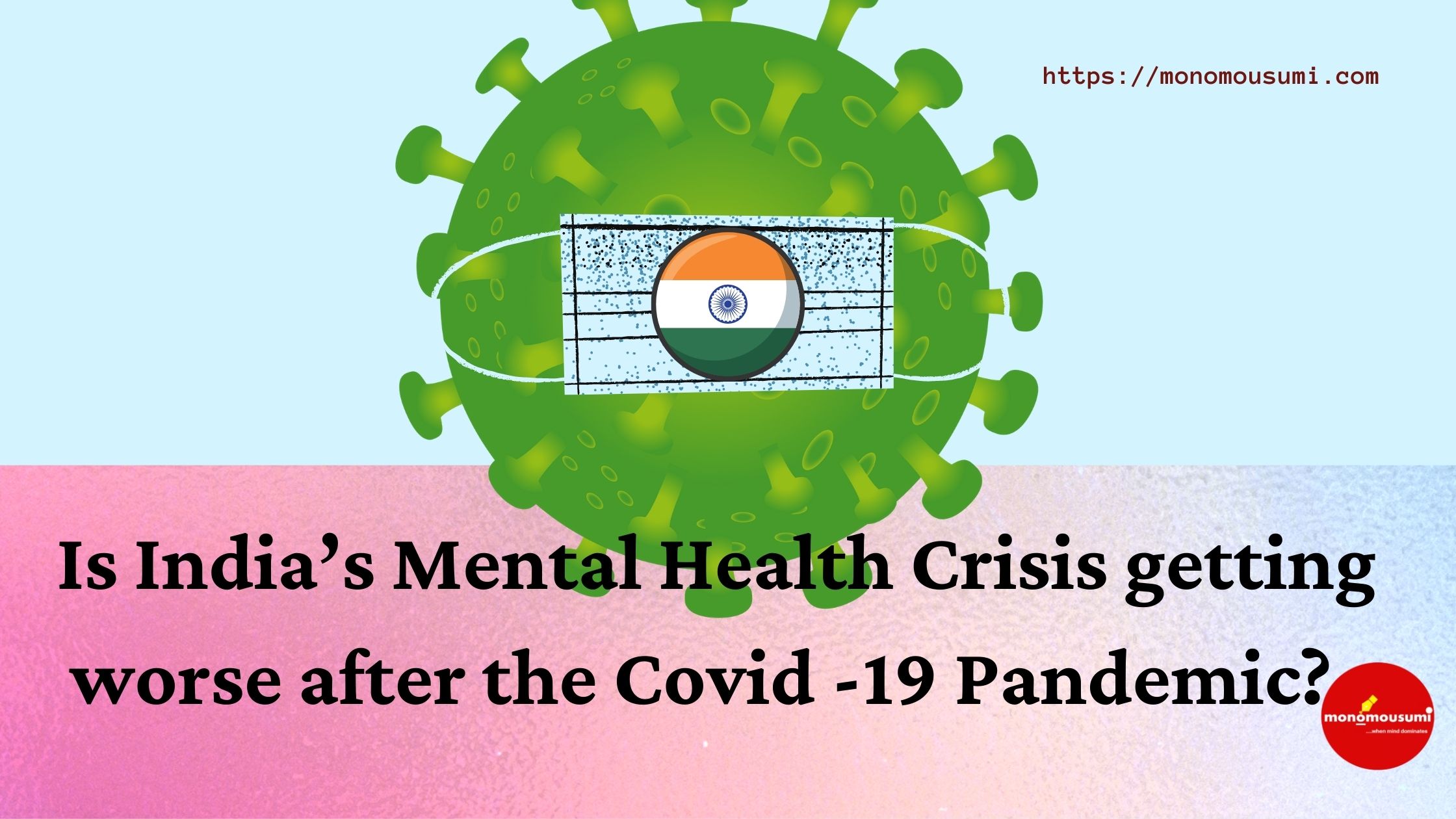
The Covid-19 global pandemic that hit the world over a year ago has only worsened the plight of people suffering from issues like stress and depression as it forced people into a lockdown. Millions of people lost their jobs, means of livelihood and members of their family. According to the Centre for Monitoring Indian Economy (CMIE), India lost 7 million jobs in April 2021 with the unemployment rate rising nearly to 8%. Adding to the emotional distress and upheaval, the lockdown also left the life of people from all kinds of domains, whether it be a working professional or a student or a housemaker in complete disarray and the near future shrouded in uncertainty. Not only did the economy take a big hit but the impact was even more widespread on an individual level, adversely affecting people not only emotionally and mentally but also physically. Many experts have also predicted that long-term isolation and social distancing can have several implications like emotional turbulence, frequent irritability, insomnia, anxiety, depression and post-traumatic stress which can last for many years. This implies that following the ongoing health crisis, there is a need to create more discussion in our society around mental health.
Mental Health has always been a taboo in the Indian society. Ranging from stress, anxiety and depression to autism, schizophrenia and intellectual disabilities, mental health problems are pervasive irrespective of the wealth, status and age of a person. However, in our society, more often than not people dismiss the existence of mental health problems and owing to the stigma and shame associated with these problems, people frequently leave them untreated. India is indeed experiencing and suffering from a mental health crisis. Despite several attempts being made to increase awareness on the urgency and importance of mental and emotional well-being by a plethora of non-profit organizations and social workers like Dr. Lakshmi Vijayakumar (founder of Sneha and WHO consultant) and Mambalikalathil Sarada Menon (founder of SCARF), as much as 83% of people in India suffer from some form of mental distress. According to India: The Global Burden of Disease Study 1990–2017 – One in every seven Indian citizens is affected by mental disorders of varying severity and the proportion of mental disorders in India has almost grown twice since 1990.
In addition to the lack of awareness and disgrace around mental health issues, another aspect that adds to the severity of India’s Mental Health Crisis is the dearth of educated and skilled professionals. The World Health Organization (WHO) paints a very grim and realistic picture of the mental health situation in our country. Based on the data provided by WHO, in India, for every 10 million people, there are only 30 psychiatrists, 12 nurses, 7 psychologists and 7 social workers available, over 10 times lower than the desirable level. It also classified India as one of the ‘most depressed countries’ in the world. In 2016, India accounted for more than one-third of the global suicides (an increase from the 25% in 1990) with the number of fatalities due to suicide and self-harm rising at an alarming rate among both genders. From its terribly high and yet increasing suicide rates to the abysmal state of mental health facilities, there is an imperative need of mental health reforms in the country, specially, in a time when the world is engulfed in a global pandemic.
Starting from the introduction of mental and emotional health lessons in schools to instill a sense of comfort and understanding in students from a young age, we should focus more on creating a safe space for people to share their feelings and struggles. Creating a more open and free flowing conversation around mental health is going to help remove the stigma and shame associated with it. This has been made relatively easier after the digital revolution in India and a widespread access to internet facilities. Online peer groups, discussion threads and forums provide a good platform for people to raise issues and queries. Investing in infrastructure and providing training to more professionals along with creating more opportunities for people wanting to pursue a career in psychology can also help in highlighting the importance of a healthy mind while bridging the gap between the supply and demand of required facilities. Improving accessibility and affordability of mental health services is key for creating a happier world.
Apart from taking steps on a more institutional level, we can also bring changes on a personal level to ensure we keep our mind peaceful and calm even during this troublesome time. Giving family members and friends a call every now and then to check up on them is a good way to combat the feeling of loneliness. The digital platform, even though not a complete substitute, can serve as an important way of connecting people. From playing multiplayer games to organizing meetings on zoom, there are plenty of activities for people to partake in as a group. Being locked at our homes has also given us a much needed time away from our fast paced lives to look after ourselves. Meditating and exercising are two habits that can be easily inculcated in our everyday lives. Taking up a hobby like painting, reading or gardening can also help relieve stress and improve our mental health. It is also advisable to seek professional help if you feel overwhelmed and unable to deal with any stressful situation. It is important to understand that seeking medical help is not something we should be embarrassed about.
Mental and Physical health are inter-related. Keeping our minds healthy is equally if not more important to live a happy and well-balanced life. However, we should also keep in mind that the pandemic has been especially hard for the many less privileged people who owing to either the lack of knowledge or resources are unable to cope with the harsh circumstances that the lockdown has forced them into. Even though mental health issues do not discriminate between people, the truth remains that the households with low levels of income are more likely to suffer from several lifetime mental disorders. Studies have shown that a reduction in income is widely associated with an increased risk of suffering from a mental health issue. The pandemic has only made the already precarious situation much worse for people across the country. The best way ahead is to help each other and be more empathetic towards those who are suffering.
India has come a long way in the past few years in terms of creating a dialogue around mental health, but it still has a very long path ahead of it to traverse in order to handle the prevailing mental health crisis. India might be facing this crisis now, but with enough determination and efforts, it is a crisis that we can avert.
By Saiyam Jain, Gurugram


